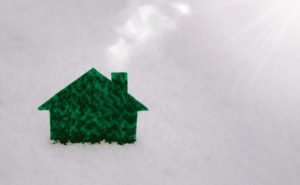Heating your home safely this winter

Despite the mild start to January, this winter is projected to be a cold and bitter one in New York state, with many regions already experiencing record chills and snowfall. Fire departments usually see an uptick in home fires during the winter, with nearly”¯half of all home heating equipment fires occurring during December, January and February. Carbon monoxide (CO) exposure and poisonings also increase during these months. ”¯
“There is an increased risk of home fires and carbon monoxide poisoning this time of year as residents use space heaters, portable heating sources, gas furnaces and fireplaces to heat their homes,” said Edward Tase Jr, president of the Firefighters Association of the State of New York. “We encourage New Yorkers to take proper precautions when they heat their homes this season.”
According to the National Fire Prevention Association, heating equipment is the second leading cause of U.S. home fires and the third leading cause of home-fire deaths. Space heaters are the type of equipment most often involved in home-heating equipment fires, accounting for more than ”¯two of every five fires (44%), as well as the vast majority of deaths and injuries in home fires caused by heating equipment.”¯
Recently, New York Gov. Kathy Hochul signed legislation to help curb the preventable deaths caused by space heater fires.”¯Legislation (S.7863A/A.9181B)”¯requires that space heaters sold in”¯the state have a”¯thermostat and an automatic shutoff and be certified by a testing and certification body recognized and approved by the United States Department of Labor, Occupational Safety and Health Administration.”¯”¯Homeowners should keep space heaters a safe distance from combustible materials, such as curtains, bedding and upholstered furniture. To prevent CO exposure and poisoning, avoid the indoor use of unvented gas-burning appliances, unvented gas or wood-burning stoves and unvented fireplaces.”¯ ”¯
“Homeowners should check that all heating equipment is functioning properly and that furnace and dryer vents are clear of ice and other debris,” Tase said. “As we turn up the heat, it is crucial to ensure that there are working smoke alarms and carbon monoxide detectors on each floor of the home and outside of sleeping areas. These devices can be the difference between life and death. We want all New Yorkers to be fire-safe this winter and remember: If there is a fire, get out, stay out and call 911.””¯
Here are some home heating tips from FASNY and the NFPA:
- Keep anything that can burn at least 3 feet away from heating equipment.
- Have a 3-foot “kid-free zone” around open fires and space heaters.”¯
- Never use your oven to heat your home.”¯
- Have a qualified professional install stationary space-heating equipment, water heaters or central heating equipment according to the local codes and manufacturer”™s instructions.”¯
- Have heating equipment and chimneys cleaned and inspected every year by a qualified professional.”¯
- Remember to turn portable heaters off when leaving the room or going to bed.”¯
- Always use the right kind of fuel specified by the manufacturer for fuel-burning space heaters.
- All fuel-burning equipment should be vented to the outside to avoid carbon monoxide (CO) poisoning.
- Make sure the fireplace has a sturdy screen to stop sparks from flying into the room. Ashes should be cool before putting them in a metal container. Keep the container a safe distance away from your home.”¯
- Test smoke alarms at least once a month.